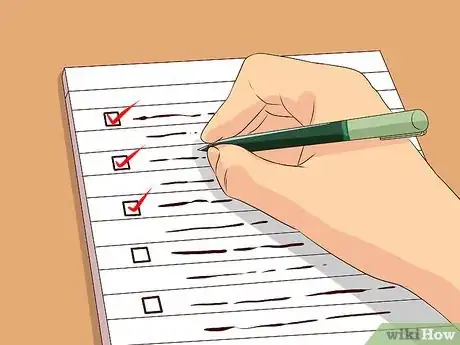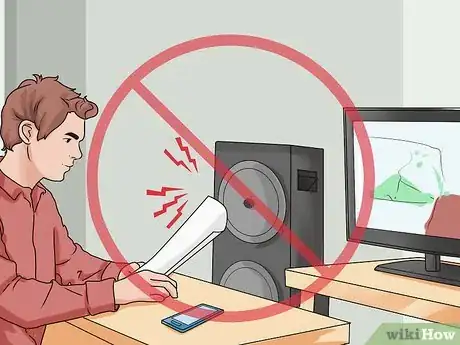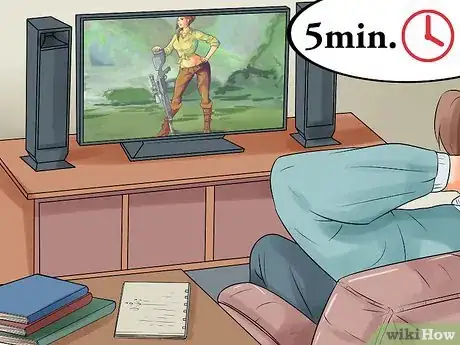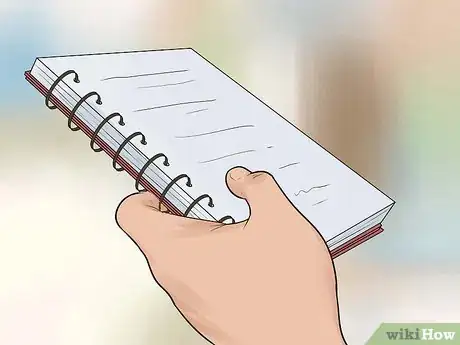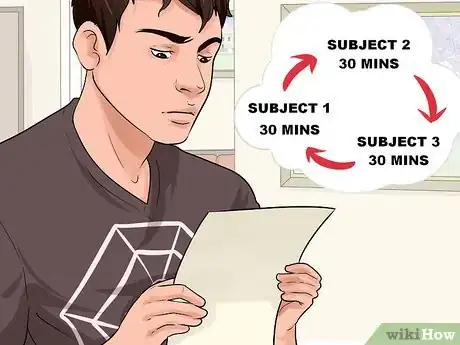This article was co-authored by Megan Morgan, PhD. Megan Morgan is a Graduate Program Academic Advisor in the School of Public & International Affairs at the University of Georgia. She earned her PhD in English from the University of Georgia in 2015.
There are 8 references cited in this article, which can be found at the bottom of the page.
This article has been viewed 28,411 times.
Believe it or not, people have struggled with procrastination since they first started having things to do. Hesiod, a Greek poet writing in the 7th century B.C., advised his readers to not "put your work off till tomorrow and the day after."[1] Fortunately, modern psychology has discovered many of the reasons why we procrastinate. With some effort and a little practice, you can beat this bad habit and be productive in college.
Steps
Conquering Daily Temptations to Procrastinate
-
1Make a to-do list to help focus on completing tasks. Write down everything you need to do on that list, even if it's not related to your college work. The goal here is to create a list so you can stop worrying about stuff on the bottom of the list while working on things at the top of the list.[2]
- Always sort and rank your items with highest priority at the top. These are things that are important and time-sensitive. You’ll feel better as you complete the most important tasks first. This will boost your morale and give you motivation for the next task.
- Make sure to focus your list on things you like to put off, not just things you do on a regular basis. Typically what you do on a regular basis will get done even if you don't put it on the list.
- Try not to deviate from your list too much. This is giving into procrastination. If as time has passed your priorities have changed, rewrite the list to reflect your current priorities. However, don't spend so much time shuffling your to-do list that you don't actually spend time working on your tasks.[3]
-
2Overcome your anxiety about the task. Think about exactly why you keep avoiding starting or completing the task. Is it because you know it will be difficult? Maybe it is not one task but many tasks. Focus on understanding what is scaring you from starting the task and facing your fear head on. Come up with ways to counteract that anxiety.
- If you are having trouble with anxiety, talk to a friend or classmate. They likely have gone through the same thing. Maybe they have some good ideas about dealing with your anxiety that you're comfortable with.
- You could also try seeing a counselor. Your college probably has mental health support services for students. A counselor can help you cope with your anxieties and develop strategies to defeat procrastination.[4]
Advertisement -
3Remove any distractions. Remove all distractions, if possible. This may mean switching venues altogether. If you are in your dorm and you are tempted to hang out in the commons area, then study in the library or at a coffee shop. If that new video game or television show is "calling your name," then be sure to study in a place where you can't play or watch.
- Turn off your phone and hide it. Especially if you like to check your messages, emails, or news. It takes a second to look at your phone but it could take much, much longer to pull yourself away if something interesting pops up.
- If you surf the internet while doing work on your computer, get a program that limits your internet use. RescueTime is a program that blocks off certain or all websites for a certain amount of time that you get to set, and it can only be taken off if you turn your entire computer off. The best part of this program is that you can download it for free online.
-
4Find something pleasant about the task. You may dread writing that paper or putting that lab project together. However, research suggests that if you can find something -- anything -- positive or pleasant about the task, you will be less likely to procrastinate on it.[5]
- For example, if you have a history paper due that you really aren't excited about writing, you could remind yourself that you do enjoy doing research. That will give you a little boost of productivity.
-
5Make realistic micro-goals. Frequently your tasks will seem monolithic because they are actually composed of multiple tasks. Break down the big task into smaller micro-tasks to be complete in sequence and separately. You will find accomplishing the micro-tasks provides a boost in your "can-do" attitude.
- Setting personal deadlines can also help overcome procrastination. For example, if you have a big paper due in three weeks, set yourself personal deadlines: research must be done in one week, your first draft must be due in two weeks, etc.[6]
-
6Commit to starting the task regularly. When you make your list or goals you will need to start them to finish them. The action of starting to work on the task, in and of itself, is powerful. Even if you don't complete the task, at least start on it and see how far you can get. You may find it's not as daunting as you thought.
- Finish the work period. If you carve out an hour to work on a task, then stick to working on that task for an hour. Even if you get distracted, keep coming back to that task during the hour. When the hour is over, you can put the task behind you. When you look back, you may not be able to say you finished it but you will be able to say to yourself that you worked on it for an hour.
-
7Reward yourself when you accomplish your goals.Even your micro-goals. When you finish an item on your to-do list, reward yourself. You may not want to do this with everything, but especially with the important stuff you've been procrastinating on, this self-reinforcement will give you something to look forward to beyond "being done".
- Don't reward yourself early. Almost finished is not finished. This discipline is important because it is what gives the rewards motivational value. Furthermore, getting the reward early may distract you from actually finishing the task.
- Make your rewards commensurate to your difficulty with the task. Don't buy yourself a big reward for a small task just because you really want that reward. Be honest with yourself and make your rewards match your effort.
-
8Join a study group to encourage each other to study regularly. When you are working with others it is no longer all about yourself. When you put something off you will look bad around others who pushed through and worked. Furthermore, if they need help, you will know that your work will be rewarded by their appreciation when you help them out.
Overcoming the Distractions That Slow You Down
-
1Commit to working at least 15 minutes each day on each big task.[7] Although 15 minutes may not be nearly enough time to complete the task, it is still 15 minutes of work. It's a small amount of time. Surely you can spare 15 minutes, right? You will get something accomplished, so see how much you can do.
- Try setting a timer. The "Pomodoro Method" suggests setting a timer for a block of time (15-25 minutes), then taking a short break, then trying another block of work time. It can help you bust procrastination, because you only have to focus for a short period of time.[8]
-
2Work during your work period regardless of your feelings. You may not have the inspiration to work. Your class schedule will tell you that inspiration doesn't matter. The task must be completed. During your 15 minute work period, focus on that finishing that task or taking care of distractions. You may not get a lot done this time, but next time you should accomplish more.
- While you work you may find distractions keeping you from working. Use your 15 minutes of work time to take care of those distractions. The next time you start working, those distractions should have already been taken care of. Now you can work without distractions.
-
3Write in a journal when you feel stuck.[9] Procrastination frequently occurs when we can't stop thinking about other stuff. Maybe you don't want to forget something or need to figure out the solution. Write down everything you are thinking. Next time you think about the issue you'll know you've already written it down to remember later or solved it.
- Writing in your journal can help you organize your thoughts. While writing, you may discover the reasons you are procrastinating. You may also find that once you write down something you don't want to forget, you stop thinking about it. You can remember you already wrote that down. Then the thought is no longer a distraction from the task you are really trying to accomplish.
- Focus your journalling to issues related to the task. You may start with "Why can I not do this? What is on my mind keeping me from working?".
-
4Review your journal weekly.[10] Look over what you have written to find patterns. You may find that a singular stress is influencing all of your work. Take some spare time to find ways to overcome that stress or deal with that problem. Adjust your next week's work by dealing with stressors that slowed you down throughout the week.
-
5Stretch your work periods as you feel comfortable. As you successfully work for 15 minutes on a task you may feel 15 minutes is too short. It likely is too short in the long run. But 15 minutes is a good starting point. Once you know you can do 15 minutes straight, try working longer periods. Instead of 15 minutes try 30 minutes or more.
-
6Reward yourself regularly for even small accomplishments. As you complete your goals or even stick to your schedule make sure to reward yourself. Don't trivialize the time spent by saying "But I didn't accomplish anything". In fact, you spent time trying to work. As you spend more time trying you will find yourself working and eventually finishing the task
- Give yourself both time-rewards and task-rewards. That means you should reward yourself for sticking to your schedule as well as completing tasks. Make sure to reward yourself based on the effort you put into either sticking to the schedule or task.
Changing Your Thinking
-
1Defeat a fear of failure. Many procrastinators delay working on things because they're afraid of failure -- e.g., thinking that if you never start that paper, at least you won't turn in a bad one.[11] Often, this fear is related to your self-esteem. You may feel that if you turn in a less-than-perfect project, it will reflect badly on you and damage your self-worth.[12]
- Try to reframe "failure" as "opportunity for growth." Even the most brilliant minds have made many mistakes. Error is part of life. However, when you make mistakes, you can learn from them. People who are able to see their mistakes as opportunities to learn and grow, rather than permanent failures, are less likely to procrastinate.[13]
- Disentangle your self-worth from your grades. This one is really hard, but think of how you would speak to a friend who just got a poor grade on a project. Would you tell her she is worthless and should feel ashamed? Or would you reassure her that the grade doesn't reflect on her as a person? Try to show the same kindness to yourself.[14]
-
2Reject perfectionism. Perfectionism and procrastination are strongly linked.[15] Many people mistakenly believe that perfectionism is beneficial, but real perfectionism can actually cause serious distress and self-worth issues.[16] Try to hold yourself to reasonable standards, rather than overly idealistic or rigid ones.
- Look for examples of "all-or-nothing thinking," a common cognitive distortion, or "thought trap," for perfectionists.[17] For example, you might believe that you are a failure if you get anything less than an A on a paper. Instead, honor your effort -- remember, you can only control your own action, not its outcome. For example, you could tell yourself, "I did the best that I could on that paper, and I am proud of the hard work I put in."
- Look for "should" statements, like "I should be able to do well in everything." These are usually signs of unreasonable standards. Try thinking about why you believe this, and try to replace "should" statements with realistic ones, such as "Nobody can be perfect in everything."[18]
-
3Build your self-discipline. One thing many procrastinators have in common is low self-discipline. [19] Making yourself do unpleasant tasks is hard, but you can build your self-discipline in several ways.
- Use "if-then" statements. This can help you recognize the consequences of your actions and set up plans ahead of time. Psychologists call this technique an "implementation intention."[20] For example, you might say something like "If I am tempted to procrastinate on this project by playing video games, I will make myself work on the project for one hour first." Having this plan will help you exercise the willpower necessary to stay on track.
- Flex your self-control muscles. Researchers suggest that the more often you practice self-control, the stronger your willpower muscles get.[21] Get regular exercise, practice healthy eating habits, and try to develop a good sleep schedule. Not only will you feel healthier, these habits will carry over into your other aspects of life too.
-
4Forgive yourself. Procrastination can cause intense feelings of shame, guilt, or anxiety about your habits.[22] These feelings can sap your energy because you end up wasting a lot of time feeling guilty over your procrastination that you could have used on the actual task. You might also end up feeling like starting later than you planned to is pointless, leading to further delay. If you notice that you have put something off, don't beat yourself up for it. Say something like, "I slipped up there, but it's not the end of the world. I can start that project right now." And then get to work!
Community Q&A
-
QuestionHow do you do your homework when you don't feel like it?
 عَمَّار نَايِفCommunity AnswerThink about the benefits it'll give you, like, your parents will be happy, you'll be happy, anything. But most of the time, you won't feel like it; you have to do it regardless of how you feel about it. Starting is the hardest part, so tell yourself that you will do it for just 5 minutes. Like Newton's law says, objects in motion tend to stay in motion; once you start doing it, you'll feel more tempted to finish it. Even if you don't finish it, doing it for 5 minutes is better than not doing it at all. Make sure to reward yourself with something fun afterwards, like reading books or watching TED talks. For further information, watch Marty Lobdell's "Study less, study more" lecture.
عَمَّار نَايِفCommunity AnswerThink about the benefits it'll give you, like, your parents will be happy, you'll be happy, anything. But most of the time, you won't feel like it; you have to do it regardless of how you feel about it. Starting is the hardest part, so tell yourself that you will do it for just 5 minutes. Like Newton's law says, objects in motion tend to stay in motion; once you start doing it, you'll feel more tempted to finish it. Even if you don't finish it, doing it for 5 minutes is better than not doing it at all. Make sure to reward yourself with something fun afterwards, like reading books or watching TED talks. For further information, watch Marty Lobdell's "Study less, study more" lecture.
References
- ↑ http://www.psychologicalscience.org/index.php/publications/observer/2013/april-13/why-wait-the-science-behind-procrastination.html
- ↑ http://www.psychologicalscience.org/index.php/publications/observer/2013/april-13/why-wait-the-science-behind-procrastination.html
- ↑ http://www.psychologicalscience.org/index.php/publications/observer/2013/april-13/why-wait-the-science-behind-procrastination.html
- ↑ http://www.psychologicalscience.org/index.php/publications/observer/2013/april-13/why-wait-the-science-behind-procrastination.html
- ↑ http://www.psychologicalscience.org/index.php/publications/observer/2013/april-13/why-wait-the-science-behind-procrastination.html
- ↑ http://www.psychologicalscience.org/index.php/publications/observer/2013/april-13/why-wait-the-science-behind-procrastination.html
- ↑ Bolker,J,(1998),"Writing Your Dissertation in Fifteen Minutes a Day",ISBN 0-8050489-1-X
- ↑ https://www.psychologytoday.com/blog/intrinsic-motivation-and-magical-unicorns/201307/manage-procrastination-the-pomodoro-technique
- ↑ Bolker,J,(1998),"Writing Your Dissertation in Fifteen Minutes a Day",ISBN 0-8050489-1-X
- ↑ Bolker,J,(1998),"Writing Your Dissertation in Fifteen Minutes a Day",ISBN 0-8050489-1-X
- ↑ http://www.psychologicalscience.org/index.php/publications/observer/2013/april-13/why-wait-the-science-behind-procrastination.html
- ↑ https://www.psychologytoday.com/blog/science-and-sensibility/201403/how-overcome-fear-failure
- ↑ http://www.psychologicalscience.org/index.php/publications/observer/2013/april-13/why-wait-the-science-behind-procrastination.html
- ↑ https://www.psychologytoday.com/blog/science-and-sensibility/201403/how-overcome-fear-failure
- ↑ https://www.psychologytoday.com/blog/science-and-sensibility/201003/break-perfectionism-procrastination-connection
- ↑ http://psycnet.apa.org/psycinfo/2012-04141-001/
- ↑ http://www.anxietybc.com/sites/default/files/Perfectionism.pdf
- ↑ http://www.anxietybc.com/sites/default/files/Perfectionism.pdf
- ↑ http://www.psychologicalscience.org/index.php/publications/observer/2013/april-13/why-wait-the-science-behind-procrastination.html
- ↑ http://www.apa.org/helpcenter/willpower.aspx
- ↑ http://www.apa.org/helpcenter/willpower.aspx
- ↑ http://www.psychologicalscience.org/index.php/publications/observer/2013/april-13/why-wait-the-science-behind-procrastination.html
